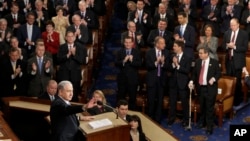The last time Israeli Prime Minister Benjamin Netanyahu addressed the U.S. Congress, nearly 60 Democrats skipped his speech nine years ago, calling it a slap in the face to then-President Barack Obama as he negotiated a nuclear deal with Iran.
With Netanyahu scheduled to address U.S. lawmakers on July 24 and his government now at war with Hamas in Gaza, the number of absences is likely to be far greater.
Congressional Democrats are wrestling with whether to attend. Many are torn between their long-standing support for Israel and their anguish about the way Israel has conducted military operations in Gaza. More than 37,000 Palestinians have been killed by Israeli fire since the Hamas attack on Oct. 7 that triggered the war, according to the Health Ministry in Hamas-run territory. The ministry does not differentiate between civilians and combatants in its figures.
While some Democrats are saying they will come out of respect for Israel, a larger and growing faction wants no part of it, creating an extraordinarily charged atmosphere at a gathering that normally amounts to a ceremonial, bipartisan show of support for an American ally.
“I wish that he would be a statesman and do what is right for Israel. We all love Israel,” former House Speaker Nancy Pelosi, D-Calif., said recently on CNN about Netanyahu.
Tensions between Netanyahu and Democratic President Joe Biden have been seeping into the public, with Netanyahu last week accusing the Biden administration of withholding U.S. weapons from Israel — a claim he made again Sunday to his Cabinet. After the prime minister leveled the charge the first time, White House press secretary Karine Jean-Pierre said, “We genuinely do not know what he’s talking about. We just don’t.”
The invitation from House Speaker Mike Johnson, R-La., to Netanyahu came after consultation with the White House, according to a person familiar with the matter who was granted anonymity to discuss the sensitive subject. As of now, no meeting between the leaders during Netanyahu's Washington visit has been scheduled, this person said.
Netanyahu said in a release that he was “very moved” by the invitation to address Congress and the chance “to present the truth about our just war against those who seek to destroy us to the representatives of the American people and the entire world.”
Republicans first floated the idea in March of inviting Netanyahu after Sen. Majority Leader Chuck Schumer, the highest-ranking Jewish official in the United States, gave a speech on the Senate floor that was harshly critical of the prime minister. Schumer, D-N.Y., called the Israeli leader “an obstacle to peace” and urged new elections in Israel, even as he denounced Hamas and criticized Palestinian Authority President Mahmoud Abbas.
Republicans denounced the speech as an affront to Israel and its sovereignty. Johnson spoke of asking Netanyahu to come to Washington, an invitation that Schumer and House Democratic leader Hakeem Jeffries of New York ultimately endorsed, albeit reluctantly. Pelosi, who opposed the invitation to Netanyahu in 2015 when she was Democratic leader, said it was a mistake for the congressional leadership to extend it again this time.
Democratic Sen. Chris Van Hollen of Maryland, who attended the 2015 address as a House member, said he saw no reason why Congress “should extend a political lifeline” to Netanyahu.
Rep. Michael McCaul, chairman of the House Foreign Affairs Committee, said it would be “healthy” for members of both parties to attend. “I think that a lot of Americans are getting a one-sided narrative, especially the younger generation, and I think it’s important they hear from the prime minister of Israel, in terms of his perspective,” said McCaul, R-Texas.
Interviews with more than a dozen Democrats revealed the breadth of discontent over the coming address, which many feel is a Republican ploy intended to divide their party. Some Democrats say they will attend to express their support for Israel, not Netanyahu.
New York Rep. Gregory Meeks, the top Democrat on the House Foreign Affairs Committee, said he has an “obligation” to attend because of that position.
Sen. Ben Cardin, D-Md., who leads the Sente Foreign Relations Committee, has signaled he will be there. Cardin said that what he’s looking for in Netanyahu’s speech is a “type of message that can strengthen the support in this country for Israel’s needs,” but also lay the groundwork for peace in the region.
Other Democrats are waiting to see whether Netanyahu will still be prime minister by the time he is supposed to speak to Congress.
There have been open signs of discontent over the handling of the war by Netanyahu’s government, a coalition that includes right-wing hard-liners who oppose any kind of settlement with Hamas.
Benny Gantz, a former military chief and centrist politician, withdrew from Netanyahu’s war Cabinet this month, citing frustration over the prime minister’s conduct of the war. On Monday, Netanyahu dissolved that body.
Rep. Seth Magaziner, D-R.I., said he stands with those "who hope that he’s not prime minister by the time late July rolls around. I think that he has been bad for Israel, bad for Palestinians, bad for America.” But, he added, he believes it his job to show up when a head of state addresses Congress, “even if its someone who I have concerns about and disagree with.”
Rep. Don Beyer, D-Va., attended the 2015 speech and described it as “among the most painful hours” he has spent while in Congress. He plans to boycott unless Netanyahu became a “champion for a cease-fire."
A large portion of the Congressional Progressive Caucus — lawmakers who are among the most critical of Israel’s handling of the war — is expected to skip. Among them is Washington Rep. Pramila Jayapal, the chair of the caucus, who told The Associated Press that it was a “bad idea,” to invite Netanyahu.
Netanyahu's visit is expected to draw significant protests.







